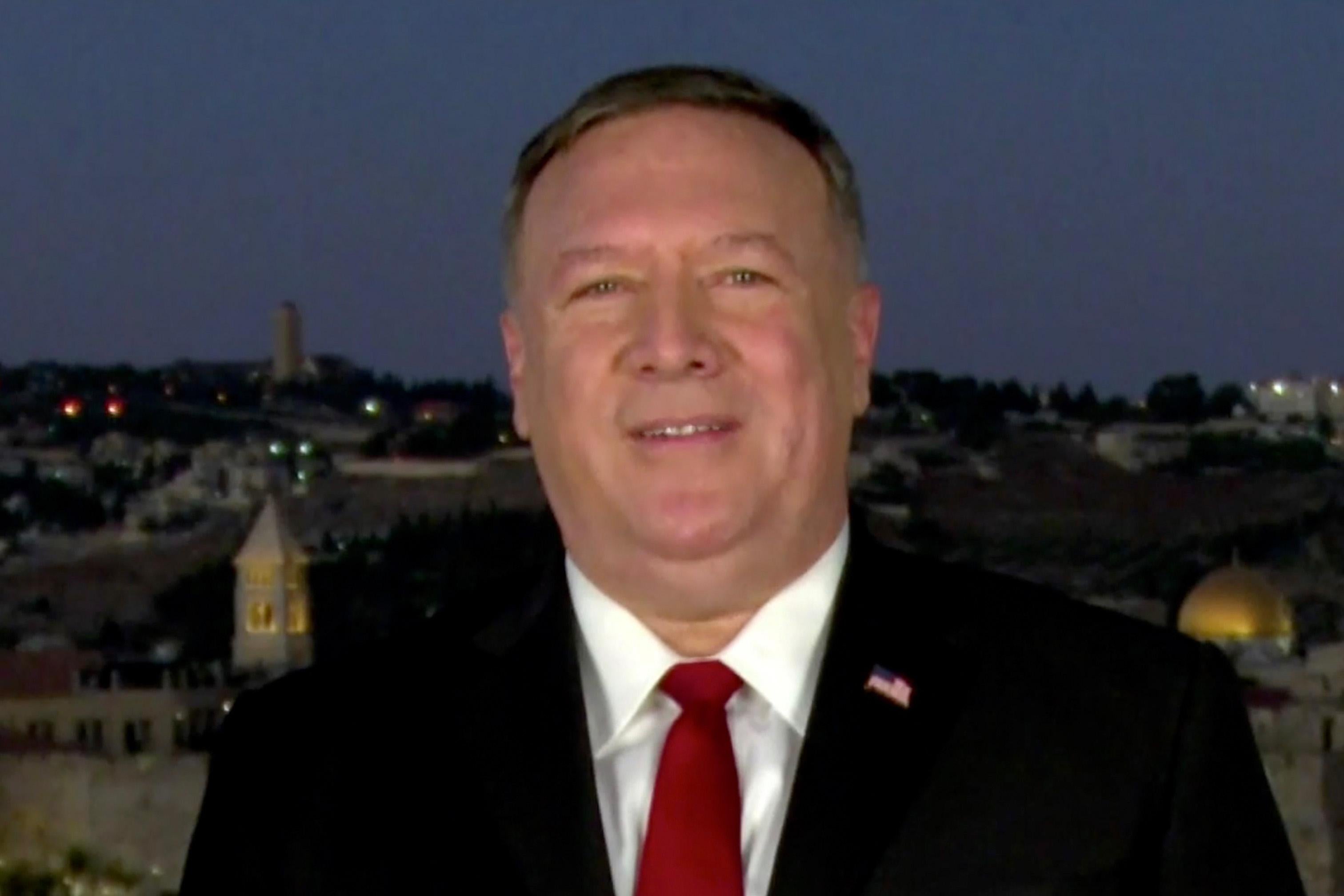Secretary of State Mike Pompeo’s speech for the Republican National Convention was as improper, deceptive, and self-serving as many expected when it showed up on the schedule.
The impropriety has already been widely noted. No secretary of state has ever spoken at a party convention. The Hatch Act forbids federal employees from taking part in political campaigns. Pompeo also violated his own guidance, sent to his underlings on Feb. 18 of this year. A boldfaced sentence in that memo read: “Senate-confirmed Presidential appointees may not even attend a political party convention or convention-related event.”
And yet there he was, in the convention’s primetime hour Tuesday night, delivering a pre-taped speech in Jerusalem, on the rooftop of the King David Hotel, looking out on the Old City, endorsing President Donald Trump’s reelection.
Pompeo’s public affairs office released a statement, saying he was speaking in his personal capacity and did not involve government resources—which, of course, is absurd. He flew to Israel on a government plane; he was no doubt escorted to the roof by government security; his assessment of Trump’s foreign policy would mean nothing if he were not secretary of state.
Once his appearance was announced, diplomats past and present expressed outrage at his partisan exploitation of his office—and of an allied nation.
But what Pompeo said was only slightly less objectionable than where and how he was saying it. For instance, he boasted that Trump “has ended the ridiculous unfair trade arrangements with China”—when, in fact, only the first phase of a trade deal has been completed, with no additional phases on the horizon. The jobs lost to China over the decades, he added, “are coming back home.” In fact, not so much.
On North Korea, he said Trump “lowered the temperature and, against all odds, got the North Koreans to the table.” Yes, but once at the table, the North Koreans did nothing and, in fact, continued to build ballistic missiles and enrich uranium. True, they have conducted “no missile tests, no nuclear tests”—but, as Kim Jong-un has said, that’s only because they had already conducted enough tests, many of them during Trump’s tenure, to give them confidence in their nuclear arsenal.
“Because of President Trump,” Pompeo claimed, “NATO is stronger”—when, in fact, he has done more to foster doubt about the U.S. commitment to NATO than any president since the treaty’s signing after World War II. He said Trump gave Ukraine “defensive weapons systems”—referring to the antitank missiles that Trump tried to withhold if Volodymyr Zelensky did not help him smear his then-likely Democratic opponent, Joe Biden. But Pompeo failed to note that, even after Trump let the missiles go, the Department of Defense insisted that the weapons be stored in western Ukraine, far from the battlefield in the east.
Pompeo credited Trump with wiping out the Islamic State’s caliphate—though several military officers have acknowledged that anti-ISIS forces had taken back half of the territory when Barack Obama was president and that the strategy that took back the rest was a slightly accelerated version of the strategy Obama approved.
The secretary of state celebrated, as he has many times, that Trump “exited from the disastrous nuclear deal with Iran”—not mentioning that, since that withdrawal (which all of Trump’s advisers at the time opposed), Iran has moved closer to a nuclear weapon and hasn’t softened its policies in the Middle East.
He said Trump “brokered the historic peace deal between Israel and the United Arab Emirates.” In fact, it wasn’t a peace deal (those two countries were never at war and had been cooperating, behind the scenes, for some time), and Trump’s only role in this deal was pledging to sell advanced F-35 jet fighters to the UAE—and the UAE’s leaders canceled a meeting with Israeli and U.S. diplomats because Prime Minister Benjamin Netanyahu expressed opposition to that sale.
Finally, at the end of his speech, Pompeo turned unabashed political spokesman, saying that giving Trump another four years was the “best way to ensure our freedoms.”
It is well known that Pompeo, 56, a former Republican congressman from Kansas, wants to run for president in 2024—an ambition shared by Nikki Haley, the former South Carolina governor and U.N. ambassador who told her own share of howlers in her RNC speech Monday night. (“Joe Biden is good for Iran and ISIS,” she claimed, “and he’s a godsend to everyone who wants to apologize, abstain, and abandon our values.”) To that end, Pompeo has brandished his standing as an evangelical at every opportunity—at this one, using the Old City of Jerusalem as the backdrop for a partisan speech, another unprecedented exploitation of an ally’s territory and a holy landscape that might be called a sacrilege or chutzpah or, on this night of this convention, which painted Trump as a champion of immigrants and a selfless public servant, normal business.

